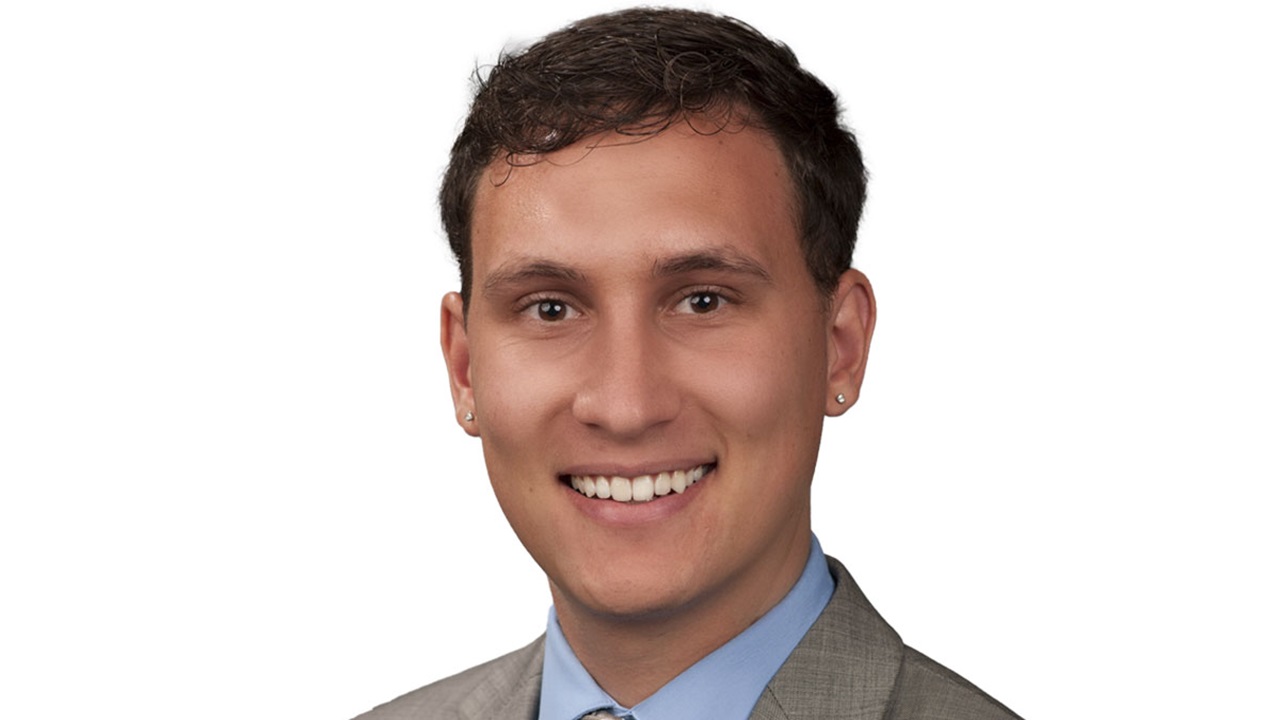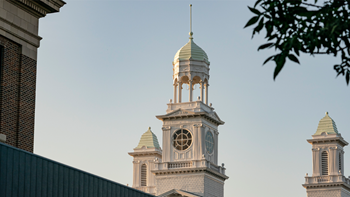USD Clinical Psychology Student Blake Warner Aims to Improve Rural Access to Mental Health

Seeking a USD degree trifecta, Warner is currently pursuing a Ph.D. in clinical and disaster psychology after obtaining both a Bachelor of Science in psychology and communication studies (2018) and a Master of Arts in clinical psychology (2022) from USD.
“I first learned about the clinical psychology program while I was a work study student at the Student Counseling Center at USD,” Warner said. “I applied and interviewed at several psychology programs in the region, but ultimately USD’s focus on community, and my own experience during undergrad, led me to the decision to be a Coyote again.”
USD offers the state’s most comprehensive psychology program and has been fully accredited by the American Psychology Association since 1971. USD’s Ph.D. in Clinical and Disaster Psychology is a 118-credit program that requires specialized coursework in subjects like rural community psychology, traumatic stress, and serving the diverse community in disaster.
The program has provided Warner the opportunity to weave his interests in adapting mental health interventions established in urban areas to better support rural populations into his research. Warner explained that because USD is in a rural area, he can take the data from using these interventions here to see if they are just as effective in rural locations.
“Rural areas have unique challenges and support needs with very different population dynamics than large metropolitan centers,” Warner said. “The data will inform what adaptations could be made to interventions in order to best serve our rural communities.”
In addition to his studies, Warner also lends his talents and experience to USD’s Center for Disabilities, where he has supported the department in various capacities for the past four years. Warner first connected with the Center for Disabilities when he was selected as a LEND (Leadership Education in Neurodevelopmental and Related Disabilities) trainee in 2019.
The South Dakota LEND program provides a specialized graduate level traineeship which focuses on the interdisciplinary training of future professionals for leadership roles in the provision of health and related services to individuals with neurodevelopmental and related disabilities and their families. South Dakota's LEND program is one of 60 LEND programs nationally funded by the U.S. Department of Health and Human Services Health Resources and Services Administration (HRSA) and Maternal and Child Health Bureau (MCHB).
It was during his time as a LEND trainee that Warner fostered relationships with members of the USD’s Center for Disabilities’ leadership team: Eric Kurtz, Ph.D. executive director, and Marni Johnson, Au.D. assistant director.
“Dr. Kurtz and Dr. Johnson have been my biggest cheerleaders,” Warner said. “Their leadership styles have helped bring out my strengths and taught me to be a better leader myself. Not only do they value what I can bring to the table, but they also often ask ‘what can we do for you?’ This question has led me to grow as a clinician, researcher and leader, and given me opportunities that I wouldn’t have imagined I could have as a graduate student.”
After serving a second year as a LEND trainee, Warner was hired as a post-master's fellow at the center for the 2022-2023 academic year.
In his current role, Warner works in interdisciplinary autism and fetal alcohol spectrum disorders diagnostic clinics, supports larger scale public and mental health projects and grant writing, and assists in training the current cohort of LEND graduate students.
“I always think of the Center for Disabilities as a hidden gem at USD,” Warner said. “The collegial work atmosphere is unbeatable. Everyone working for the center is focused on the same mission of providing services to individuals with disabilities and their families. It leads to collaboration and relationship-building that is beyond anything I have experienced elsewhere.”
Warner’s academic and research endeavors extend beyond the USD community. For the past year, Warner has also worked remotely with the University of California Los Angeles (UCLA) Semel Institute for Neuroscience and Human Behavior Program for the Education and Enrichment of Relational Skills (PEERS) Clinic.
PEERS is world-renowned for providing evidence-based social skills treatment to preschoolers, adolescents and young adults with autism spectrum disorder (ASD), attention deficit/hyperactivity disorder (ADHD), anxiety, depression and other socio-emotional problems.
It was his work with the PEERS clinic that inspired his research using the PEERS intervention for autistic youth living in rural areas.
“As a LEND trainee, I was fortunate to become a PEERS certified provider,” Warner said. “At the training, I was taken aback with the utility of the intervention and knew it was something I wanted to use as part of my career. I come from a small town and understand some of the challenges that can arise living in rural locations.”
Warner grew up in Windom, Minnesota, a rural, manufacturing community located between Sioux Falls, South Dakota, and Mankato, Minnesota, with a population just under 5,000 people.
“Research with rural populations is generally behind that of urban populations, so I saw a chance to combine my passions and use the expertise of my mentors while engaging in research,” Warner said.
One of those opportunities for research was with fellow USD alum Denise Marandola, Ph.D.
“I was so fortunate to work with Dr. Denise Marandola in Sioux City to run a PEERS group. With data from her clinic, I will be able to compare the effectiveness of the intervention in rural areas versus urban areas for my doctoral dissertation,” Warner said. “I hope to use the data from my research to make adaptations to the PEERS curriculum so it can be tailored for use in rural areas.
“We know that people in rural areas have mental health needs just like everyone else,” Warner continued. “Unfortunately, South Dakota and other rural states have far fewer mental health professionals than more populous states. There is also the matter of population dispersion in that those living in rural parts of the state may have to travel to population centers like Sioux Falls or Rapid City to receive services. We can more effectively provide mental health services by providing telehealth options and by adapting interventions for use specifically with rural populations.”
Beyond the academic and career opportunities Warner has experienced at USD, he also expressed gratitude for the wider USD community.
“I have had so many impactful supporters at USD through the years,” Warner said. “Everyone in the psychology department has supported and guided me. I have been encouraged by the choral department and have been fortunate enough to participate in music throughout my graduate studies.”
Warner’s plans for the future circle back to his experience at the Center for Disabilities.
“By far the biggest impact on my career path has been through the USD Center of Disabilities,” Warner said. “Part of what makes the Center for Disabilities so special is its status as a University Center for Excellence in Developmental Disabilities (UCEDD).”
Warner further explained that UCEDDs provide interdisciplinary training, conduct research, provide clinical services, and engage in policy and advocacy work related to disability services.
“I knew I wanted to continue to work in a UCEDD going forward, which is part of why I ranked UCLA as my top choice when applying for the match. UCLA is also a UCEDD,” Warner continued. “After I graduate, I hope to continue to work in a UCEDD long-term, whether that be in South Dakota, California, or somewhere else.”
Warner will be moving to Los Angeles in June, and beginning in July, he will work full-time at UCLA as he completes the last leg of his Ph.D.




